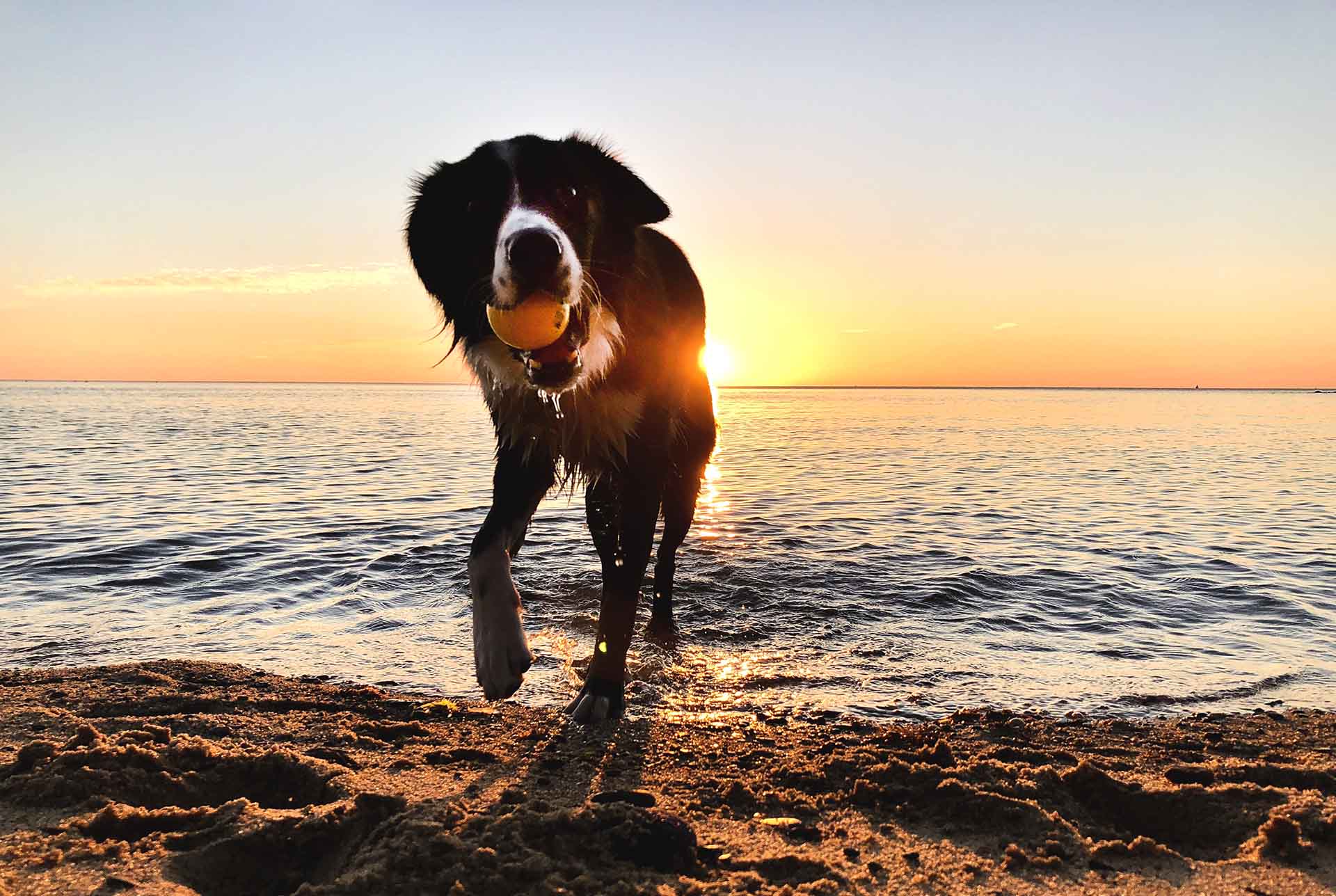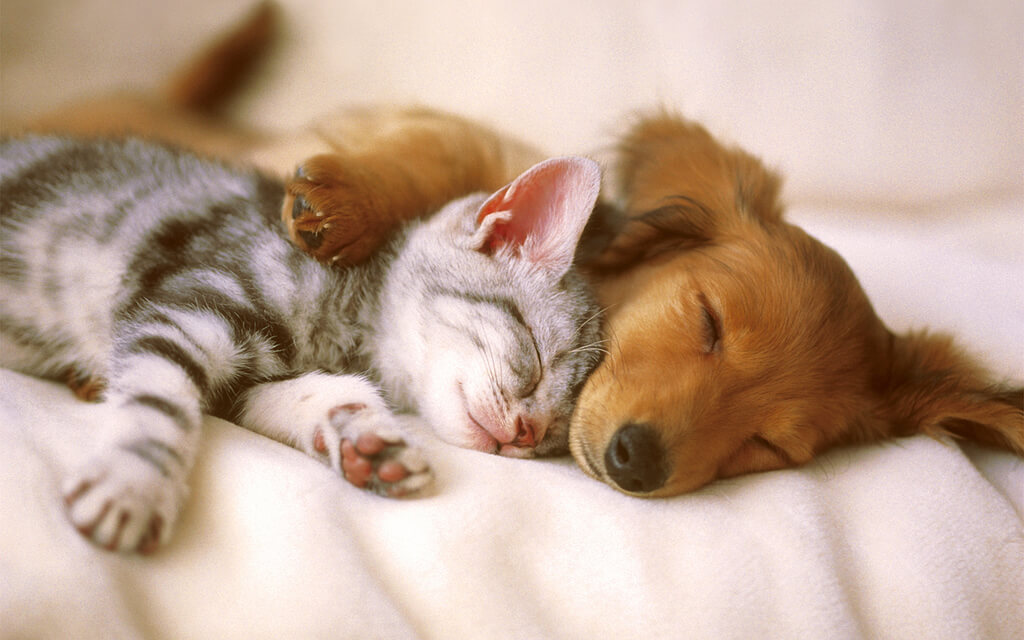-
My border collie Mac has that working dog kind of energy. The type of energy that would keep him chasing a frisbee until he literally collapsed from exhaustion. And he seems to be intelligent enough to outsmart both me and my husband.
Living in inner city Melbourne with a small yard, I often wonder if he gets bored. And if there are things we can do to make sure he gets the mental and physical stimulation he needs.
To find out, I spoke to certified dog trainers Ebony Aitken-Thorpe and Sarah Lumber from Positive K9 Training about doggy boredom, and what you can do to keep dogs physically and mentally stimulated.
Signs your dog is bored
“Every dog is different and will have individual signs to indicate they’re bored. The behaviours they tend to display include destructive behaviour, vocalisation, attention seeking behaviour, or obsessive behaviours like tail chasing, shadow chasing, obsessive licking or pacing,” advises Sandy.
However, she stresses that these behaviours can also be signs of separation anxiety, and seeing a certified dog trainer can help you to tell the difference.
If your dog is bored, it’s not necessarily a sign you should jump up off the couch to keep them entertained. While it’s not okay for your dog to be constantly bored or under-stimulated, it’s okay and even essential for your dog to learn to be calm and switch off sometimes.
“It is important for every dog to learn that outside is for fun, excitable activities, whilst inside is for calm cuddles and casually wandering around, and for all the household members to maintain this expectation,” Ebony says.
Based on this advice, my dog Mac definitely won’t be enjoying any more games of fetch down the hall.
Physical and mental play ideas
Most breeds were originally bred for a purpose, whether that be herding, guarding livestock, hunting, retrieving fowl or something else. It’s in their nature to use their brains and all that energy on a daily basis. That’s why play is so important for their development, and to prevent behavioural issues.
Here are some of Ebony and Sarah’s tips for keeping your dog happy and healthy.
Train, train, train
Most dogs love to learn, and love to please. Obedience training is a rewarding and important part of owning a dog. Nor only does it give them a mental challenge, it teaches them to learn, have self-control and handle a little bit of frustration. So why not use your dog’s next meal for a training session?
Mix it up
Just like us, dogs get bored of the same old walk day after day. Try to take your dog to new and exciting places each week. It will give them a chance to explore new sights and smells, and ensure they’re comfortable in different places.
Play with their food
Make your dog work for their food. Fill a food dispensing toy, for example a Kong, with kibble or frozen food. You can also use an empty water bottle (with all the small plastic pieces removed) or an egg carton with holes in it. Sprinkling food across the yard is also a good way to engage their natural urges to search and sniff, and build a good association with outside. On hot days, you can try freezing water and treats inside an ice-cream container to keep them cool and entertained.
Send them to school
Obedience, herding, agility, nosework, tracking, flyball – there are loads of classes out there for dogs designed to give them a good mental and physical workout. They can be lots of fun for owners too. Check in with your state dog club (for example, Dogs Victoria) for recommendations.
Get them chewing
If you’re out and about, giving your dog a chew or bone can help keep them entertained throughout the day. Pigs ears, bully sticks and kangaroo tendons are a few chews to choose from.
If you’re giving them a bone, make sure it’s a non-weight bearing bone that they can crunch up and ingest, like brisket bones, lamb necks, kangaroo tails, chicken wings and chicken necks. Large marrow bones can damage their teeth. It’s also important to watch them with their bones the first few times to make sure they don’t swallow them whole. Check with your vet if you are unsure.
With all this advice in mind, it looks like there are no more easy meals in Mac’s future. And we’ve got one more great excuse to head out on more dog-friendly adventures!
Positive K9 training offers in-home dog training in Melbourne’s northern and eastern suburbs, as well as weekly group classes.
Is your dog bored?


Looking for Pet Insurance?
They bring out your best. Help protect them with Medibank Pet Insurance.
Three updated cover levels now available!ꭥ Plus, health members save 10% on premiums.# T&Cs apply.
Things you should know
Medibank Pet Insurance policies entered into for the first time prior to 30 August 2023 and subsequent renewals of those policies are issued by The Hollard Insurance Company Pty Ltd ABN 78 090 584 473, AFSL 241436, arranged and administered by PetSure (Australia) Pty Ltd ABN 95 075 949 923, AFSL 420183 (PetSure) and promoted and distributed by PetSure’s Authorised Representative (AR) Medibank Private Limited ABN 47 080 890 259, AR 286089 (Medibank).
Medibank Pet Insurance policies entered into for the first time on or after 30 August 2023, and subsequent renewals of those policies are issued by PetSure and promoted and distributed by PetSure’s AR, Medibank.
Any advice provided is general only and does not take into account your individual objectives, financial situation or needs. Please consider the Product Disclosure Statement (PDS) ensure this product meets your needs before purchasing, or choosing to continue with the product. PDS and Target Market Determination available at medibank.com.au/pet-insurance.
-
How is ‘phubbing’ hurting your relationships?
Here’s how to stop phubbing and be more mindful of your phone habits, to help improve face to face interactions with your family and friends.
-
Are the winter blues real?
Simple ways to boost your mood in winter.
-
Mental fitness explained
Just as you work to strengthen your body, your mental health deserves attention and exercise too.
-
Signs it's time to visit the dentist
Nobody wants to go. But there are good reasons to – promise.
-
The link between stress, anxiety and jaw pain
Physiotherapist Michael Chan explains how stress and anxiety can cause jaw pain, and how to help get some relief.
-
When you can't sleep next to your partner
You love everything about them – except their sleep habits.




.jpg)
